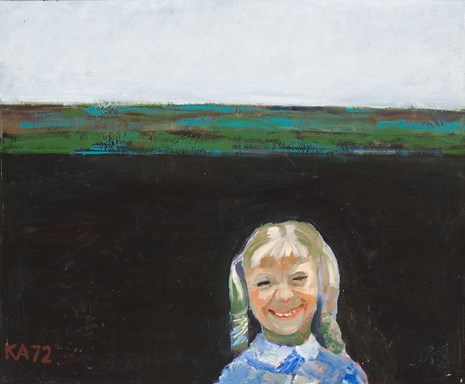Algimantas Jonas Kuras

Algimantas Jonas Kuras
Hymn to a Broken Smile
The rusted scraps of mechanisms peaking in the grass, strange,
almost unrecognisable industrial objects eroded by the flow of time
and jarringly reminding of the ugly side of civilization's
progress. These are the painting motifs that artist Algimantas
Jonas Kuras (b. 1940) has been consistently studying throughout his
creative career, which spans over 60 years.
This exhibition is akin to a poetic retrospective, presenting the
works of the famous painter, the winner of the Lithuanian National
Prize for Culture and Arts, and highlighting its relevance in the
context of today's flourishing ecological, quasi-religious
ideologies. The issues of human impact on nature, pollution,
exploitation of natural resources, recycling, animal body
preparation, and human-object-mechanism are often explored in the
contemporary fields of arts, nature and social ideas. The
eco-catastrophic mood permeates our daily lives and our future.
Looking at Kuras' painting, one could falsely assume seeing only
ecological themes in it. However, the author's goals were to oppose
the prevailing ideological background and the propaganda of the
optimistic Soviet reality.
The oeuvre of Kuras and his contemporaries (Arvydas Šaltenis,
Kostas Dereškevičius, Algimantas Švėgžda) in the 1970s marked an
ideological breaking point when the young generation began to
oppose the Soviet official culture by choosing creative subjects
filled with stinging irony, absurdity, kitsch and banalities. In a
personal diary, A. J. Kuras wrote about his and his friends' goals
the following:
'Aestheticizing should be avoided. I suggest looking more
critically at all embraced phenomena, opposing the urbanistic
understanding of taste, mocking (with works) stagnation, negligence
in art, or vice versa, showing one's truth as an example; hence we
decided, active critical realism.'
Thus monumental mechanisms, idealised, aestheticized industrial
landscapes began to be replaced by depictions of everyday
situations and the environment: meat grinders, people in public
transport or toilets, crops being fertilised with chemicals from a
helicopter... The author was attracted to everything that was
considered borderline in the Soviet culture postulating progress -
abandoned locations, storage rooms, and garbage dumped in the
forest, which he used as painting motifs, and also brought back to
the workshop as interesting sculptural ready-mades, from which he
constructed assemblages or installations in his environment.
Having been raised in a rural environment, A. J. Kuras nurtured a
unique aesthetic approach, which critics called the 'garbage
poetry.' However, the real protagonist of the paintings is time,
which condemns material existence to decay and constantly reminds
us of its transience. There are only two consistent, unchanging
elements - the earth and the skies. Between them is just a
momentary smile.
This is the first exhibition of such a scale presenting a broad
panorama and chronology of the artist's oeuvre, consisting of works
stored in the Lithuanian museum funds, private collections and
works owned by the author. The exhibition also offers an
opportunity to discover Kuras's original and artistic texts - the
eyewitnesses of the changing era, representing the development of
the author's ideas, and the most important creative principles,
which created the foundation for postmodernist thinking in
Lithuanian visual arts.
Curator Jolanta Marcišauskytė-Jurašienė
Architect Ūla Žebrauskaitė-Malinauskė
Graphic design Laura Grigaliūnaitė
Light artist Milvydas Kezys
Coordinator Ernestas Parulskis
Coordinator of installation Mindaugas
Reklaitis
Lenders to the exhibtion:
MO Museum, M. K. Čiurlionis National Museum of Art, Lithuanian
Film Centre, Vilnius "Mintis" gymnasium, "Kultūros barai",
Alfonsas Andriuškevičius, Dangis Babikas, Irena and Vytautas
Butrimai, Aleksandra Jacovskytė, Egidijus Jakubauskas, Zigfridas
Jankauskas, Rimas Kuliešius, Algimantas Kunčius, Algimantas Jonas
Kuras, Ramunė and Robertas Lauciai, Viktoras Liutkus, Vidmantas
Martikonis, Juozas Matonis, Vygaudas Meškauskas, Visvaldas
Neniškis, Gintaras Rinkevičius, Evaldas Rimšelis, Mindaugas
Ruseckas, Vladimiras Tarasovas, Loreta and Mikas Vaicekauskai
Project funded by Ministry of Culture of the
Republic of Lithuania
Organisers: Lithuanian National Museum of
Art, National Gallery of Art
Sponsors:"Exterus", Fundermax
Media Partners: JCDecaux, Artnews


